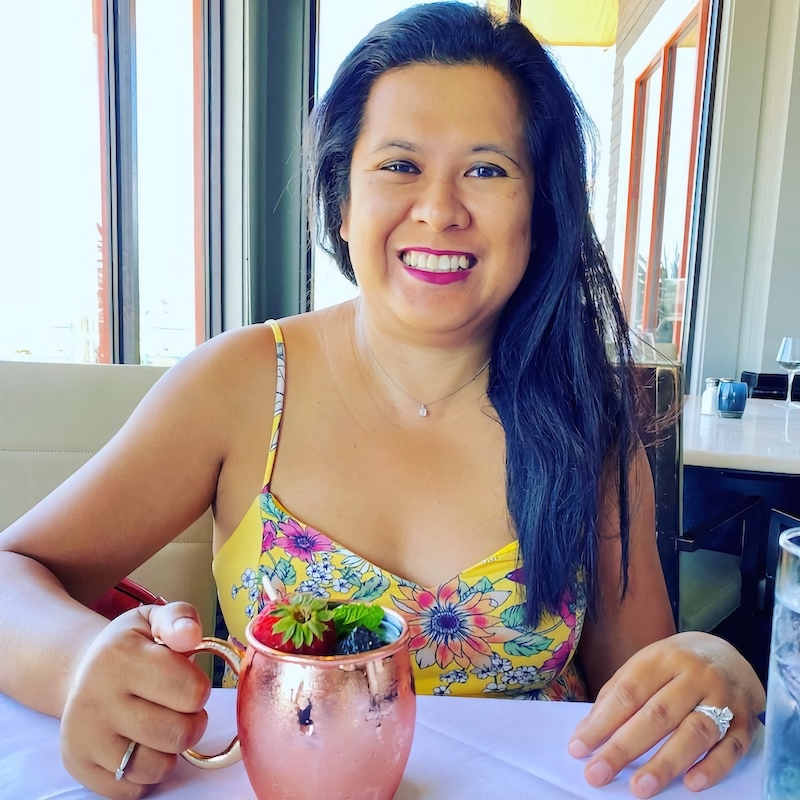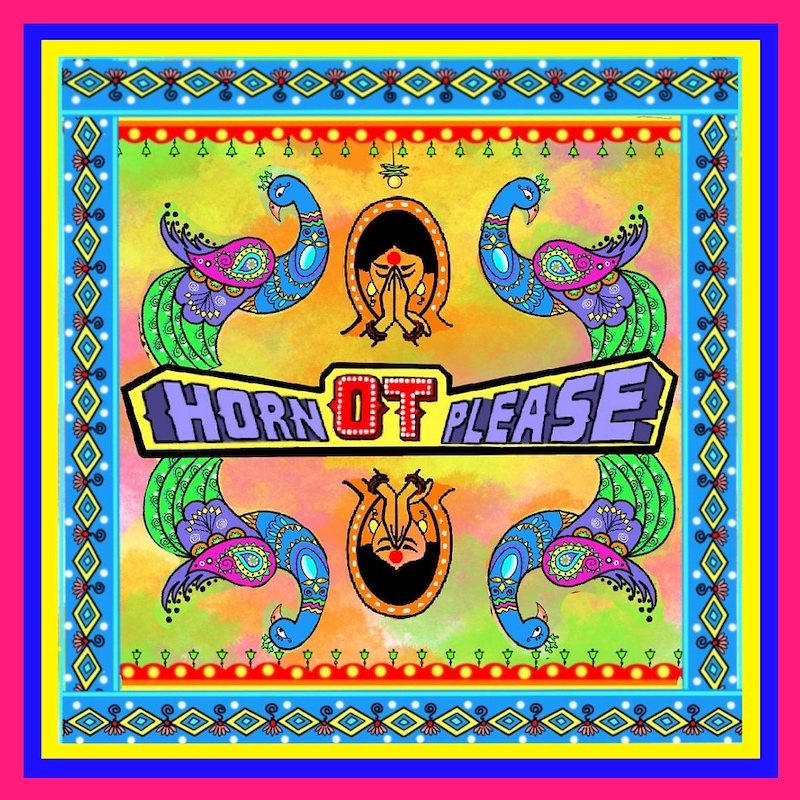Student Blog
International
WOSC 2022: Redefining Inclusion Towards Social Transformation ⟩
September 12, 2022, by Global Initiatives Team
International What are OS/OT?
By Abby Khou, MA ’23
The inaugural World Occupational Science Conference was a gathering of occupational scientists, occupational therapy students, practitioners and educators, and members of the interdisciplinary world who have dedicated their lives to the work of social transformation through the knowledge from the body of work of Occupational Scientists. Held at the Sheraton Wall Vancouver Centre in Vancouver, British Columbia, one of the featured speakers at WOSC 2022 was Dr. Sridhar Venkatapuram, Associate Professor in Global Health and Philosophy at King’s College London and Deputy of King’s Global Health Institute and Director of Global Health Education. Dr. Venkatapuram spoke about the importance of values in science and promoting a capabilities approach that emphasizes quality of life, among other themes that set the tone for conference. Dr. Lilian Magalhães was another featured speaker, and is an adjunct professor at Federal University of São Carlos, Brazil and Associate Professor at Western University in Canada where she is Professor Emeritus. She highlighted her lifelong work in Occupational Science, her familial roots, and the commitment of Occupational Science to social transformation. The inaugural event was hosted by the University of British Columbia Occupational Science and Occupational Therapy and the International Society for Occupational Science.
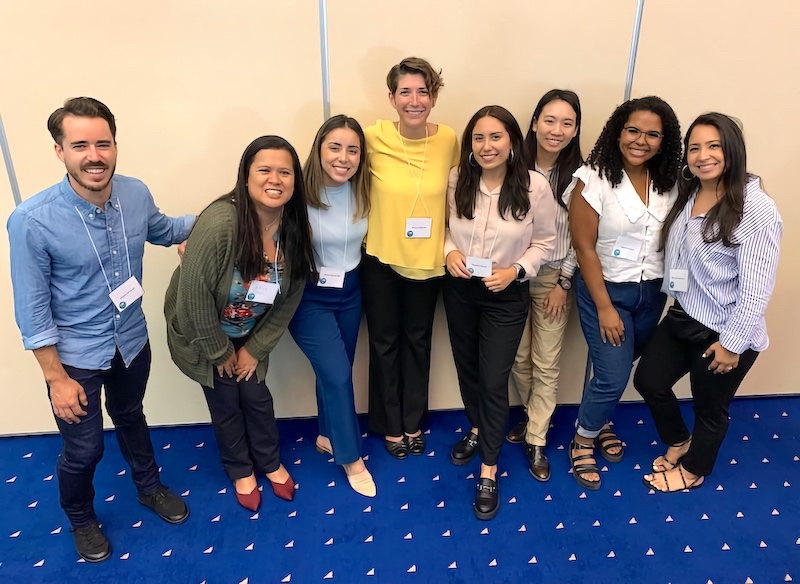
Adam Strizich, Abby Khou, Silvia Hernandez, Dr. Rebecca Aldrich, Daniela Flores, Yen Wen Pan, Kayla Brown, Monica Martinez
Our very own Dr. Rebecca Aldrich, Chair of the International Society of Occupational Science, along with Lisette Farias, Debbie Laliberte Rudman, Lilian Magalhães, Nick Pollard, and Roshan Galvaan, led a dialogic session entitled: Promoting an ‘unconference’ space for transformation of occupational science through critical dialogue. According to Farias et al. (2022), an “unconferencing” approach “prioritizes participation, reflection, and dismantling presenter-attendee hierarchies” (p. 4). By sitting in two concentric circles, the outer circle was able to actively listen as the inner circle addressed the question prompts and verbalized their thoughts. Participants spoke about Occupational Therapists and Occupational Scientists working hand in hand to achieve social change, the need for interdisciplinary involvement, and breaking away from traditional modes of communication such as research, to more grassroots initiatives such as those involving social media.
As a USC Chan second-year master’s student, a mother to a 6-year-old diagnosed with ASD and first-time conference attendee, I appreciated the themes of inclusion, play as occupation, belonging and the access of children to play and play spaces and the overarching theme of mobilization towards social transformation. There were a few presentations that particularly struck me, and further ignited my desire to advocate for a redefined sense of inclusion, the promotion of belongingness within the ASD community, and the awareness of play as occupation.
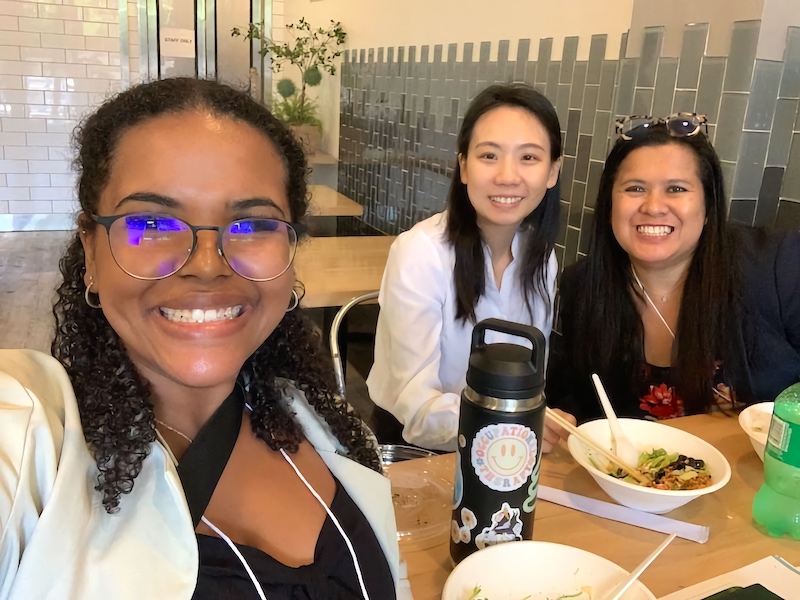
Kayla Brown, Yen Wen Pan, Abby Khou
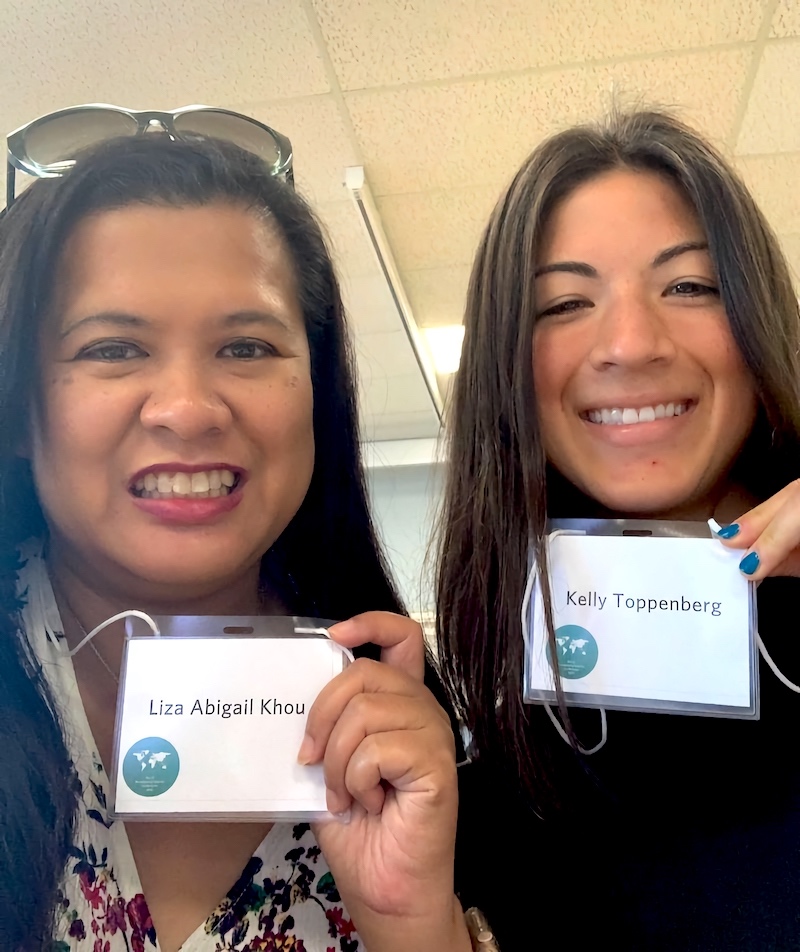
Abby Khou, Kelly Toppenberg
The passionate quality of the presentations on belongingness sometimes included tears, as presenters remembered their lived experiences of being a sibling to a disabled family member, or losing one’s cultural identity in the process of migration. I myself thought of my son Ethan while viewing “The Belonging Project: Conditions that support belonging for people with intellectual and developmental disabilities” presented by Paige Reeves, David McConnell and Shanon Phelan. I couldn’t help but share my own experiences as a member of the special needs parents community, sometimes being caught up in the pursuit of “services,” filling up my son’s schedule with therapy and appointments. “The Belonging Project” made me stop and think: does inclusion also result in exclusion if our idea of inclusion is for children to be included in manufactured spaces that we have created for them? Must we take away the agency of disabled children and plan out their days for them without consideration of where they truly want to be and who they desire to connect to? Is there a need to redefine the theory surrounding inclusion, mobilizing to translate into practice as we begin to chip away at the iceberg of social transformation? Reeves began her presentation quoting Reinders: “We create space and include people with [intellectual disability] as citizens . . . but do we also include them in our lives as human beings?”
The very definition of inclusion was questioned across different related presentations. The idea of having a “façade of inclusion,” that is, convincing ourselves as practitioners and caregivers of individuals with disabilities, that if we complete our checklists of the things we must do to advocate for our children’s inclusion, then our work is done. Comparing the façade of inclusion to the actual experience of being included was discussed in Paige Reeves, David McConnell and Shanon Phelan’s presentation: “The (radical) role of belonging in expanding and shifting understandings of social inclusion.” The Occupational Science perspective that the team was advocating for was a “paradigm shift” into a “meaningful involvement of disabled children’s voices.” What comes to mind is pediatric interventions that are child-led, respectful of families’ perspectives and culture, and the act of simply and truly listening in however way possible to the children when they communicate with us whether by verbal or by behavioral expression.
There is so much more to unpack from WOSC 2022 that I may not be able to express in this medium. I attempted to encapsulate such a wide and varied experience in the blog medium, but not quite able to represent all the meaningful experiences that I had at WOSC 2022. I had so many great and profound conversations and met so many wonderful people. As I moved from the conference back into my everyday life in my intersectional roles, I was filled with so many great ideas, a desire for social transformation and a further igniting of my passion for Occupational Science and Occupational Therapy. Maybe I left with more questions than answers, but that can be a good thing. Questions can lead to answers and answers can lead to solutions, and hopefully, continuing change.
References
Farias, L., Aldrich, R., Laliberte Rudman, D., Magalhães, L., Pollard, N., & Galvaan, R. (2022, August). Promoting an ‘unconference’ space for transformation of occupational science through critical dialogue [Dialogic session]. World Occupational Science Conference 2022, Vancouver, BC, Canada.
Reeves, P., McConnell, D., & Phelan, S. (2022a, August). The belonging project: Conditions that support belonging for people with intellectual and developmental disabilities [Paper presentation]. World Occupational Science Conference 2022, Vancouver, BC, Canada.
Reeves, P., McConnell, D., & Phelan, S. (2022b, August). The (radical) role of belonging in expanding and shifting understandings of social inclusion [Paper presentation]. World Occupational Science Conference 2022, Vancouver, BC, Canada.
⋯
Magic of GI ⟩
May 4, 2022, by Global Initiatives Team
Community International What are OS/OT?
By Maggie Goodfellow MA ’21, OTD ’22
Editors Alison Chang and Vanessa ElShamy
Entry-Level Professional Master’s students
If I told you there was magic behind one of the doors in CHP, would you believe me? Well, no — not the traditional type of ‘magic’ that involves playing cards or bunnies appearing out of hats, but rather, something even better. Behind the doors of CHP 161, you’ll find the magic of a global community, the magic of pushing boundaries, and the magic of discovering what it means to “grow together”. In case you couldn’t tell, the first word that comes to my mind when I think about Global Initiatives is . . . Magic (surprise!).
#1. The Magic of a Global Community. The door (and room) of CHP 161 can be quite deceiving at first glance. However, upon opening the door, you’ll immediately find a friendly face who will welcome you in and ask you about your day. As someone whose home is across the world in South Korea, the GI office quickly became my home away from home, somewhere I could go when I needed a break in between classes, somewhere I could trust would be welcoming and safe, and somewhere I knew a friend would be. The irony of our small office is that inside it lives a global community. Everyone’s culture is welcomed and the mundane interactions, such as sharing snacks from our respective countries or creating a poster for a holiday, become the building blocks of lifelong friendships. There’s something very special about the friendships built through GI, as they are grounded in our shared love for celebrating each other’s cultural differences and upbringings. Through Global Initiatives, I’ve seen the magic that can happen when you not only keep the door open for others, but also provide them with a seat, listen to what they have to say, and recognize there is always an opportunity to learn from them.
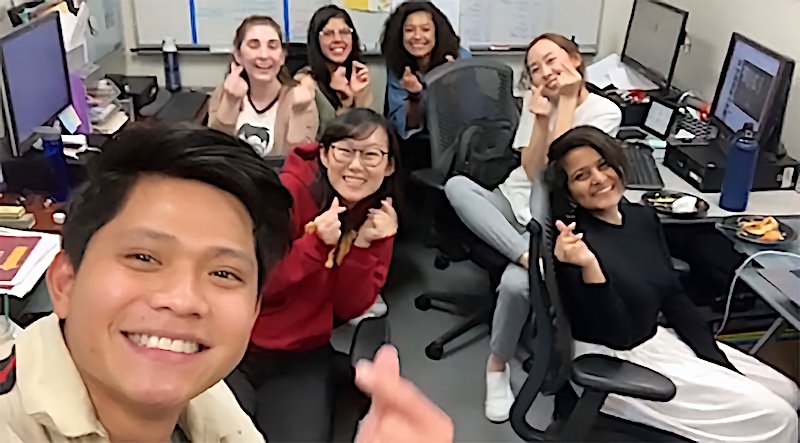
Moments in the office — our door is always open!
#2. The Magic of Pushing Boundaries. When it comes to magic tricks, you typically see the outcome but rarely see the hard work and determination that’s required to master them. More importantly, it takes confidence and the belief in yourself that you can do something that seems impossible. While it seems silly to compare the projects of GI to a magic trick, quite frankly, some of the projects did seem impossible at first. To name a few, just over the past 3 years our team has implemented Frientorship Circles, a global poster exchange, a global Pen Pal program, a “Global Citizenship” thread in the new Entry-Level OTD curriculum, and so much more. I’m incredibly grateful to this team who has time after time shared their creativity and demonstrated the power of creating something with their hearts and the intention to uplift others. Moreover, none of this would be possible without Danny Park, who empowers each member of our team to take their ideas and transform them into reality. Together, this is what creates the magic to push and continue pushing boundaries.
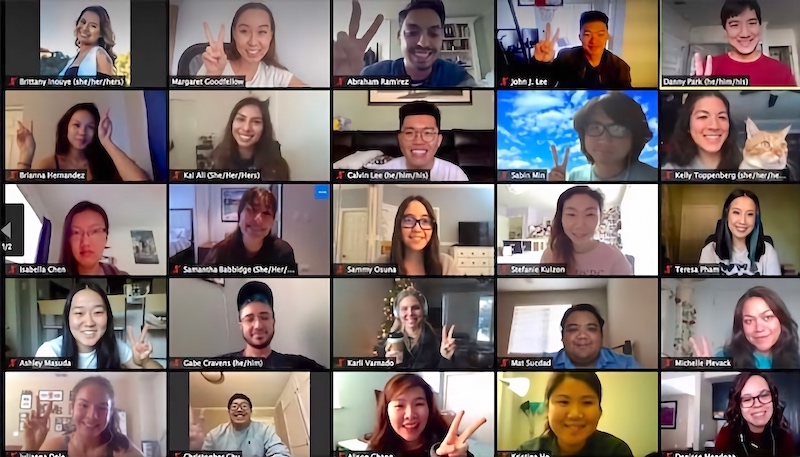
Friendtorship Circle meeting from 2020 — we had students from across all of Chan’s academic programs!
#3. The Magic of “Growing Together”. When I first joined Global Initiatives as a student worker, I was a first year MA-2 student who was eager to learn yet shy in voicing my opinions. It’s funny how, in just three years, I’m able to see so much growth in myself, both personally and professionally. Thank you, Global Initiatives, for being part of my journey and showing me that growth rarely happens alone — it happens through the mentorship and support of others. From celebrating birthdays to accomplishing various professional milestones together, I could not have asked for a better team to grow with by my side.
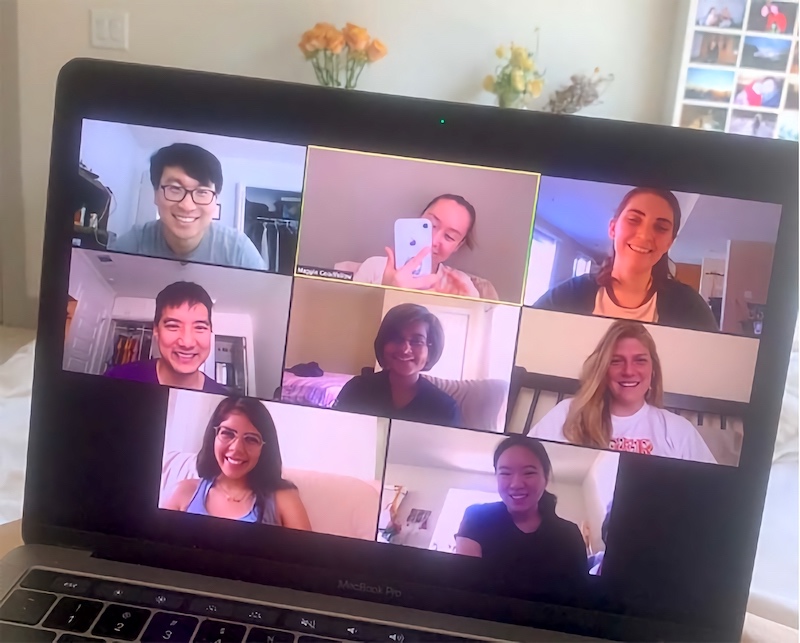
Fun fact — our team used to be 8 people total! We really have grown together individually and as an office
⋯
Everything I know about life, I learned from OT ⟩
April 20, 2022, by Global Initiatives Team
Getting Involved International What are OS/OT?
By Josh Digao, Post-Professional Master’s Student
Editor Alison Chang and Vanessa ElShamy
Entry-Level Professional Master’s students
I am from a country that still has, at its very core, patriarchal values. Not to say that the Philippines is a backwards country, but I and a lot of the pre-social media generation Filipinos were raised to believe that men were supposed to act a certain way. When you are raised in such an environment, it becomes what you believe to be right and wrong. Growing up, I felt trapped in a box that dictated how I should think, act, and speak in order to be accepted as a tunay na lalaki (real man). “Don’t care too much”, “Don’t show your emotions”, “Never let others tell you you’re wrong.” In my mind, being this arrogant, unfeeling, uncaring person was what being a man meant. But I struggled with that belief; I did not want to align myself with that archaic idea of a “real man.” It was not until I took up OT that I learned I did not have to.
It was in OT school, the pontifical and royal University of Santo Tomas, that I met some of the strongest and most wonderful people who helped me unlearn my ideas of toxic masculinity and made me the person I am today. The first of which was a professor that tried her best to instill in her students the value of being kind. A Mabuting OT (kind OT) - that is what she wanted us to be. For her, it did not matter as much that you knew all the therapeutic techniques in the book, or that you could name every muscle, bone, or nerve in the human body. What mattered was that when faced with a client, you would treat them with the utmost respect and compassion, regardless of status, age, or ability. “It’s better to be the kindest therapist than the smartest therapist” is what she would always tell us. It was not until I encountered my first few clients that I realized just how right she was. Clients, and even their family members, responded best to therapy when they felt that their autonomy and personhood was respected and cared for.
The second lesson was that of empathy. This one I attribute to the remarkable group of humans I call my friends. I have been lucky enough to be around people who are deeply loving, sensitive, and emotionally mature. Through them, I learned that in order to truly understand the emotions of others, we need to be attuned to our own. However, before I could learn to comprehend my emotions, I had to allow myself to first feel them. This realization would come to not only help me in my personal growth, but in my professional growth as well. In clinics and hospitals, I would often encounter people at their lowest points. During those moments, I realized more than ever the importance of being empathetic to other people’s struggles.
The last lesson came from my clinical instructors during my internship. Being new to the field, I was largely unconfident in my skills and abilities. I had no experience, and on top of that, the knowledge I was heavily relying on was purely theoretical. But when my clinical instructors (all of whom were amazing OTs) gave me feedback, they would focus on what it was that I did well. They recognized my strengths first, and that gave me the foundation that I needed to develop my own professional identity. I learned not only to accept the person I was, flaws and all, but to also be confident in what I bring to the table.
I believe that OTs are some of the most incredible people out there. The kindness and wisdom that I have seen from every single OT I have met continues to amaze me. Though I consider myself to be a deeply flawed person, they have taught me that the person I am is enough. I have learned that the only way to be a “real man” is to be true to yourself. As I am currently in the process of unlearning outdated values from my childhood, I know that perfection is not my goal; kindness, understanding, and acceptance are. If we extend these values toward ourselves, we will realize that at the end of the day what really matters is we are all trying our best - and we can already be proud of that.
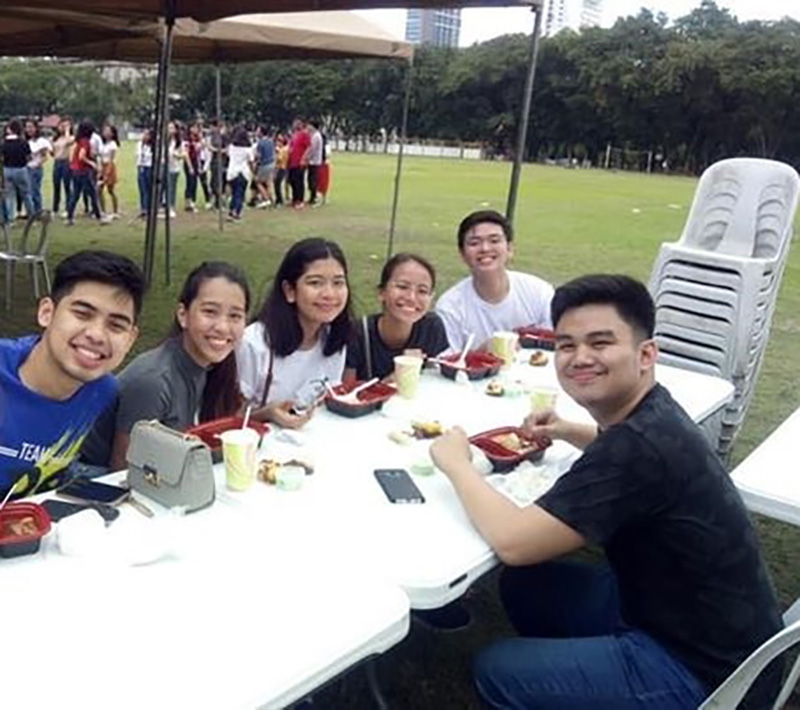
Josh and his friends back at UST
⋯
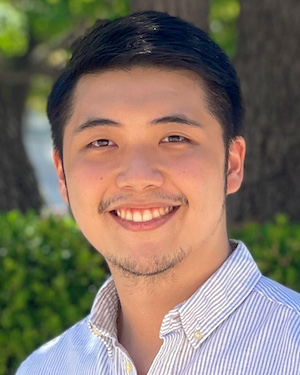
A Letter to the Future International Students ⟩
April 5, 2022, by Marvyn
Admissions Community International
Hello there!
If you are reading this blog, you are either a current student (whom by no means I coerced to read LOL), you are aspiring to become a student of USC Chan, or you are already on your way to becoming one. Wherever you may be in your life, I encourage you to read on.
Allow me to tell you this: Being a part of the USC Chan community is genuinely a life-changing opportunity. I am not saying this just because I am a student ambassador, but I am genuine when I say that my experience at USC Chan has been so enriching and filled with countless, irreplaceable memories. If you have been following all my blog posts, I have nothing but love for the Post-Professional Master’s program and USC in general. No matter what your professional and/or life goals are, USC Chan is the best place to achieve them. I still cannot believe how lucky I am to belong in such a great community of professionals!
I actually didn’t think I could become a USC Trojan. I was already working as a pediatric occupational therapist back in the Philippines, and I was very happy. I was already touching people’s lives in a way that OTs uniquely do. With that said, I always felt like I needed to grow and expand my horizons. So, when I saw the opportunity to apply for USC in this program, I felt like I was about to battle a behemoth. It was so intimidating. I was asking myself, “Why would the university even consider someone like me to be part of their program? I’m so delusional to think that they would spend time looking at my profile!” The funny thing is, the only reason that motivated me to shoot for the stars, aka making and submitting my application, was because I was stuck in the middle of a pandemic lockdown. I guess you could say that circumstances work for you as long as you give it a shot.
I’ll affirm what you may feel: It is quite daunting to take on such an endeavor as this — being away from your family, being challenged to be on your own, and navigating through your life mostly by yourself. But what I can also say is that in pursuit of your goals in life, everything can be made possible with the exposure you get to people around you at USC Chan. I was so fortunate enough to be given the privilege of meeting such a diverse group of people from all over the world! I never felt like I was alone and I knew that we all have something in common: our passion to become the best occupational therapists we can be. So even if I knew that the road I am taking is very long and difficult, I also know that I have people right by me who can support me in my aspirations.
Breaking out of your comfort zone is definitely what you can expect from this experience. Based on my own experience, I felt like the past year has been such a year of growth for me in a way that’s not just about being an OT. As a dreamer and an aspirer, this past year really pushed my boundaries and shaped (and re-shaped) who I thought I was and who I want to become. I believe that being placed in such an uncomfortable situation can lead to the most growth in your life. Truly, I am a waaay better person than I was before, and I can never trade this evolution for anything.
Now that I’m at the home stretch of my program (ONE MONTH LEFT!), I feel like I need more time. I’m not ready to leave USC Chan yet. It feels like I just got here, and I am still getting used to all the growth I am having under the USC blanket. But that’s the thing, right? Putting yourself in situations that push you out of your comfort zone is a crucial part of the USC experience. Being part of the program is much more than just studying; it is about gaining experiences that will truly change your life. And now that I am almost done with the program, I feel like USC is thrusting me toward another set of challenges and opportunities for growth. I guess I’m liking the feeling of discomfort after all!
Alas, I am writing all this because I just want to tell you all how excited I am for you to experience what I have had during my time here at USC Chan and much more. It sounds bittersweet to think that I am about to graduate and that all of you will fall in love with USC Chan in your own unique way. I will forever be grateful to USC for giving me this chance of a lifetime, and I truly look forward to seeing what the future holds for not only myself but for you as well. You are truly in for a ride of your life.
⋯
A spicy podcast from the land of spices! ⟩
March 1, 2022, by Global Initiatives Team
Diversity International
By Prutha Satpute, OTD USC alumni; Cohost and editor of HOTP
By Sakshi Tickoo, BOTh, Personal Counselor; Cohost and PR head of HOTP
By Varada Pisharody, MsOT, OTR/L; Cohost and CEO of HOTP
Editors Brittany Inouye and Abraham Ramirez
Entry-Level Professional Master’s students
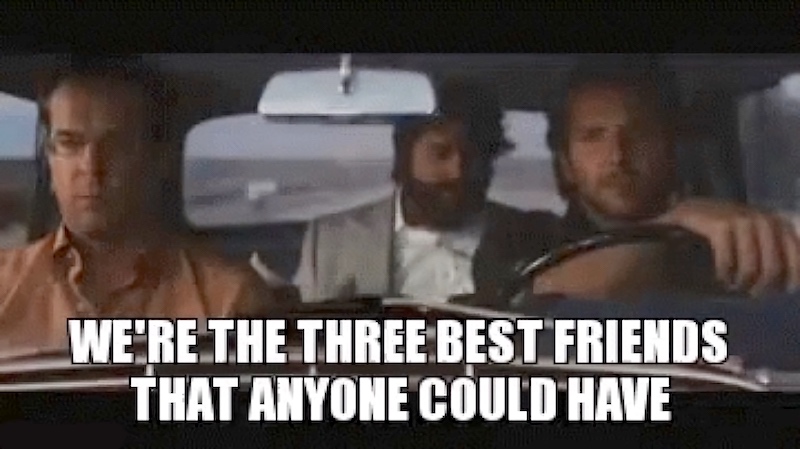
Who are we?
We’re the three best friends
that anybody could have
We’re the three best friends
that anybody could have
And we’ll never ever ever ever
leave each other!
We are three OTs from India, who are at different phases in our (professional) lives, with three completely different personalities, living in 3 different time zones (east coast, west coast, and India). Regardless of these differences we have one thing in common — our love for each other and what we do.
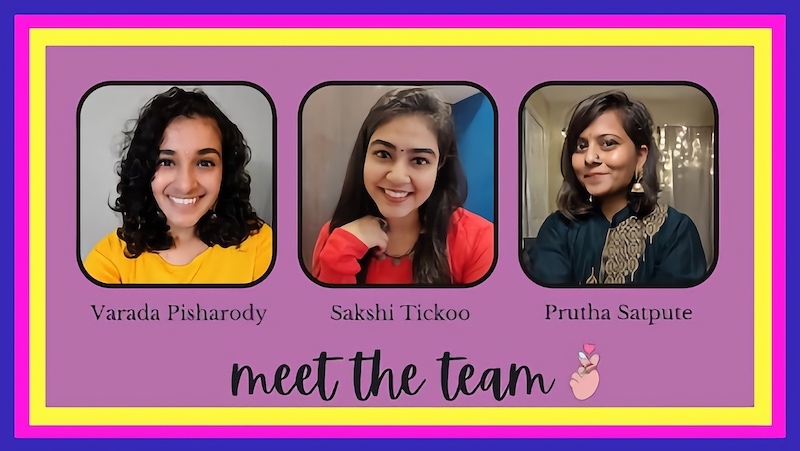
We decked up for a long-distance photoshoot for the launch of the podcast. For more details on who we are check out our website: hornotplease.com
What do we do?
Well, throughout our Bachelor degree years we found ourselves within the grasp of knowing what OT was but never really being able to pinpoint how the core values and fundamentals of our profession related to the everyday lives of people. At the same time, when we would watch Netflix shows or social media trends, we would find these amazing links back to the things we were learning in our textbooks about environmental context and human behavior. The more evidence we found of such links, the more we felt the need to create a platform that would appeal to the minds of OTs who were tired of their mid 20th century Western world-view textbooks. So, in June 2021, we founded Horn OT Please — a student friendly podcast that uses Occupational Science as its backbone to understand OT practices, values, and principles with the help of modern-day educational perspectives. Horn OT Please ended up being the first ever Indian OT podcast available on all listener platforms; this was not only special but it added to the sense of value and responsibility for the work we are doing. So, every week despite our busy schedules and unkind time zone differences (I complain because I wake up at 7am on a Saturday!) we hop on Zoom to study, research, and record our sessions. We try to cover a wide range of topics like:
- Student life
- Ups-downs, perks-disappointments, joys, and wonders of being an OT
- What is OT education like in India and other countries?
- OT Education
- Reforms in OT books and teaching methods
- OT soft skills
- Prepping for the big scary world
- OT Practice
- Non-traditional settings, areas of practice, and interventions
- Personal anecdotes
How do we do it?
Simply reading words on paper did not challenge us to think critically in a client-specific scenario. On the other hand, watching the Oscar winning movie ‘The Father’ gave a visual, auditory, cognitive, mental, and emotional character to the signs and symptoms of Alzheimer’s, making it more real and relatable. We are constantly in search of narratives and stories fictional/non-fictional that can act as a medium for learning and understanding OT concepts. We use scientific manuscripts, journal articles, movies, documentaries, history, art, trends on Instagram, TikTok, and other non-traditional media to blur the line between academic and non-academic learning materials.
Why do we do it?
Because we can. For a long time we waited for OT professionals who could answer our questions and make sense of our fanatical ideas. As the three of us have started diverging into different practice areas and settings, our inquisitiveness has only led to more questions that remain unanswered. Horn OT Please is our safe haven. And we hope that it becomes a space where disparate worlds of thought can come together; challenging OTs globally to think outside the box, and further advance our profession.
If you have any questions or would like to know more you can reach us through our socials — email: .(JavaScript must be enabled to view this email address), Instagram: @hornotplease, website: hornotplease.com.
⋯






